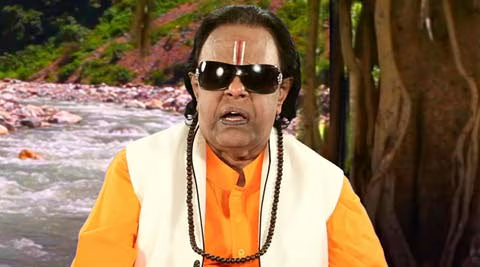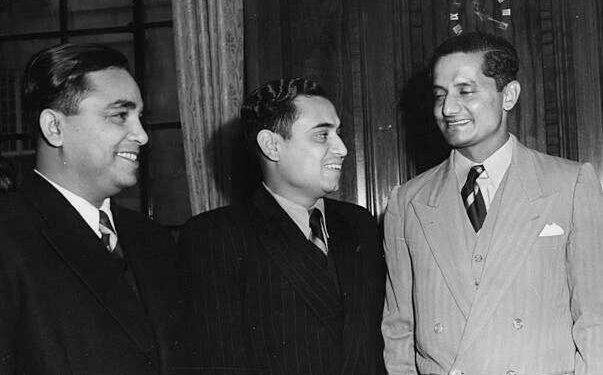History News Desk !!! Ravindra Jain (English: Ravindra Jain, born- 28 February, 1944, Aligarh, Uttar Pradesh; death- 9 October 2015, Mumbai, Maharashtra) was a famous musician and singer of Indian Hindi cinema. He was mainly fame as a bhajan singer. Ravindra Jain was such a musician of Hindi cinema, who understood the world with the eyes of the mind. Through the seven notes of Sargam, he returned many times more than the society found from the society. Along with being a creator of melodious tunes, he was also a great singer and he also surprised everyone by composing most of the songs. After the blind uncle Krishnachandra Dey of Manna Dey, Ravindra Jain was the second person who created a history in the audio-audience with only the help of audio, which became exemplary for the younger generation.
Introduction
Renowned musician and singer Ravindra Jain was born on 28 February, 1944 in Aligarh city of Uttar Pradesh state. His father’s name was Pandit Indramani Jain and mother Kiranadevi Jain. The order of Ravindra Jain in his seven brothers and a sister was the fourth. His eyes were closed by birth, which was opened by father’s friend Dr. Mohanlal with surgery. Also said that there is light in the child’s eyes, which can grow gradually, but do not let it do any work, so that the eyes are stressed.[1]
A hymn, a rupee
Ravindra Jain’s father chose the path of music keeping in mind the doctor’s advice, in which the eyes are less utilized. Ravindra tried to know and understand everything with the eyes of his mind by commanding his father and brother. Listened to many novels urging the elder brother. Understand the meaning of poems. Religious texts and history-men were considered to be the heart of life. He was such a sharp intellect since childhood that he would have memorized the thing that he would always remember. His childhood was spent in the family’s religion, philosophy and spiritual atmosphere. He used to go to the temple every day and sing a hymn and recite a hymn there was involved in his routine. In return, Dad also used to give one rupee reward on a bhajan song.
Mischief
Ravindra Jain may have been blind, but he did a lot of mischief in childhood. The family’s rule was to step into the house before the sun set and eat. Ravindra never followed this rule. Come home late at night. Mother would save her from father’s poles. In their room, she would hide food under the bed so that the child would not be hungry. Ravindra used to make a team of songs and singing with his friend congregation and used to mander around the railway station of Aligarh. His friend had a small tin box, on which he used to sing and entertain every visit. One day I did not know that the compartment was straightened. Seeing his open mouth, the listener started putting money in it. The box was filled with the chillar. On coming home, he poured a chillar at the feet of the mother. When Dad saw this, he became red-yellow with anger and ordered to return all the money. Now the problem came that how to return the money by searching strangers? Friends planned to go to the chaat shop and eat the chaat-dumplings fiercely and enjoy it.[1]
Commercial start
Ravindra Jain had heard a lot about Calcutta (present Kolkata) and ‘Ravindra Sangeet’ there. Tauji’s son Padma Bhai proposed to walk there, and immediately agreed. Dad gave seventy five rupees for pocket money. Mother tied rice and pulses in a cloth bundle. When the train came down with his brother at Kanpur station, the train started running. Padma Bhai climbed. Ravindra tried to run away. One hand out of the compartment pulled them inside. The stranger said that- “Stay with us until the brothers meet.” Through filmmaker Radheshyam Jhunjhunwala, Ravindra got a tuition to teach music. Salty samosa with tea in remuneration. The first job was at 40 rupees a month at Balika Vidya Bhavan. In this city, he met Pandit Jasraj and Pandit Mani Ratnam. He was introduced to the new singer Hemlata. They started composing tunes in Bangla and other languages. Due to closeness with Hemlata, he started getting offers from Gramophone Recording Company. Got a chance to play harmonium in a Punjabi film. The presentation on the public platform started getting up to Rs 151. In this connection, he came in contact with Haribhai Jariwala (Sanjeev Kumar). This bird of Calcutta flew to Mumbai.
Mumbai arrival
In 1968, Rabindra Jain came to Mumbai with Radheshyam Jhunjhunwala and first met the playback singer Mukesh. Ramrich Manhar gathered opportunities to sing in some festivals. The shooting of the film ‘Paras’ was going on in Devalali near Nashik. Sanjeev Kumar called the producer N. N. Got to Sippy. Ravindra heard many precious songs and tunes one after the other from his treasure. Among the audience were Shatrughan Sinha, Farida Jalal and Nari Sippy. His first film song was recorded on 14 January 1972 in the voice of Mohammad Rafi.[1]
Success
Through Ramrich Manhar, Tarachand Barjatya of ‘Rajshree Production’ met Ravindra Jain’s film career. Amitabh Bachchan, Nutan starrer ‘Saudagar’ did not have the scope of songs. Despite this, Ravindra made sweet tunes for the merchant selling jaggery, which became memorable. It was from here that the caravan of Ravindra and Rajshree’s sargam proceeded. The songs of ‘Tapasya’, ‘Chitchor’, ‘Salahne’, ‘Fakira’ became popular and Ravindra Jain’s name was established in Mumbai musicians. When Sachin Dev Burman became ill at the time of ‘Deewangi’, he handed over the film to Ravindra Jain. Ravindra Jain-Hemlata was singing in a Mahfil. Raj Kapoor was also among the audience. On hearing the song ‘Ek Radha Ek Meera both Shyam Ko Chaha’, Raj Kapoor jumped, said- “Do you give this song to anyone?” Rabindra Jain overturned, “He has given Raj Kapoor.” The bus, from here, got his entry in Raj Kapoor’s camp. Later, the music of ‘Ram Teri Ganga Maili’ was composed by Ravindra Jain and the film and music became very popular.
Death
Ravindra Jain died on 9 October 2015 in Mumbai, Maharashtra.






